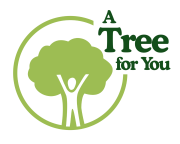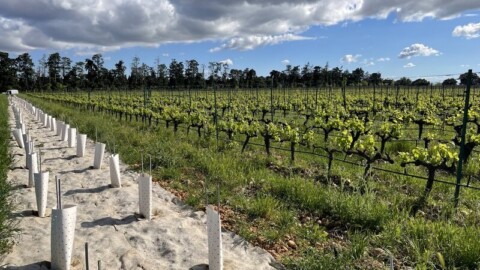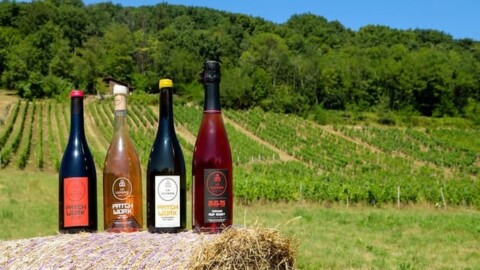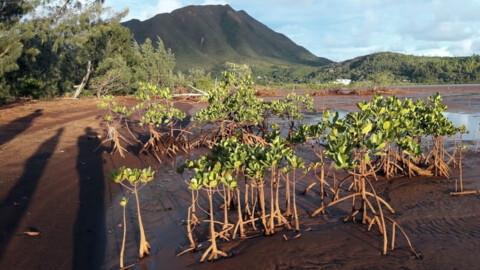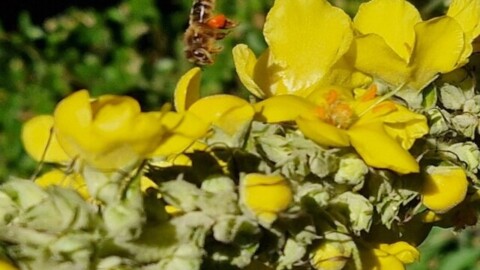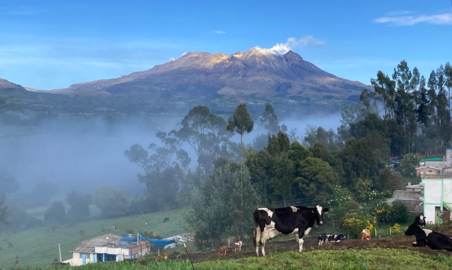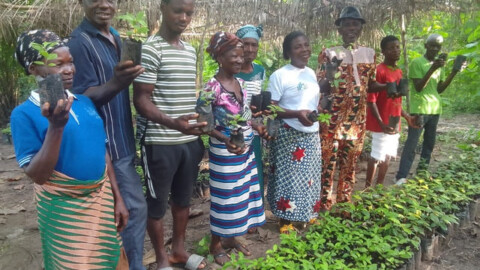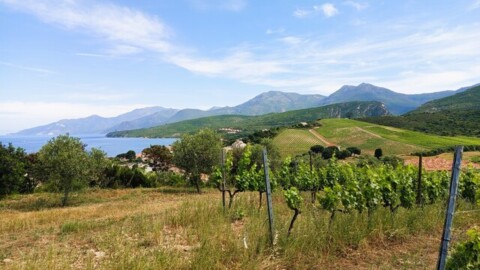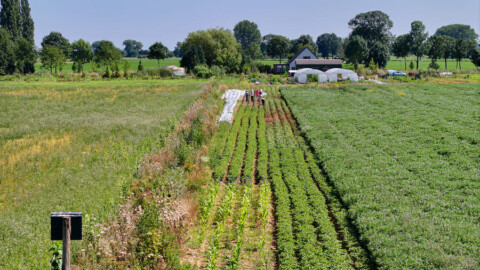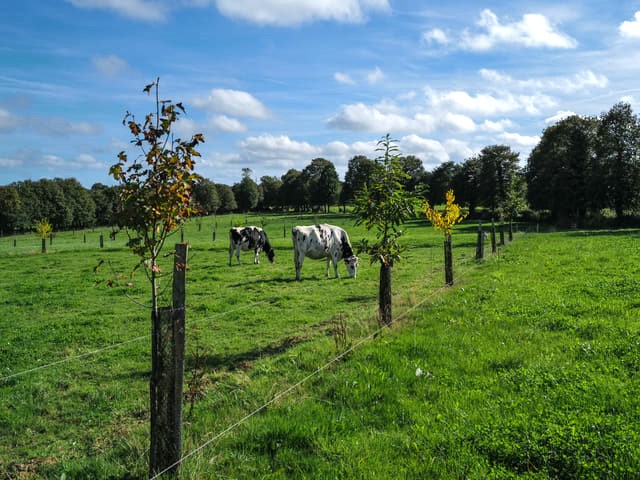
Background & challenges
The objective vo of this project is to set up an innovative and ambitious agroforestry system on 30 hectares of grazed grassland in Plélan-le-Grand, Brittany. The initiative is part of an agro-ecological transition on the farm to improve animal welfare and the quality of the meadows, so as to increase the grazing time of the dairy herd. It stands out for its innovative and experimental nature:
- Scale of the project: it involves almost all the plots of land on the farm, integrating the trees into an overall approach to fodder autonomy.
- Diversity of arrangements: the project plans to test different types of agroforestry arrangements, with comparative experimental methods, drawing on the results of research projects and scientific sites up and running elsewhere in France.
- Technical innovations: the project is implementing innovative technical solutions for protecting plantations and managing dynamic rotational grazing, especially mobile protection for fodder hedges.
Led by GAEC La Métairie Neuve, together with Agroof, the project is supported by a network of French technical and scientific partners (Collectivité Eau du Bassin Rennais, Agrobio 35, INRAE Lusignan Centre de recherche Nouvelle-Aquitaine-Poitiers, Institut Français de la Vigne, etc.).
Planting 1 869 trees should deliver multiple benefits for the environment, beneficiaries, and the local community:
- Improved soil health: contributing organic matter, better structure, boosting water and mineral retention.
- Protectingthe water cycle: nitrate filtration, less need for irrigation water.
- Enhanced biodiversity: creation of habitats for flora and fauna, development of spontaneous flora.
- Creating a favourable microclimate: protection against excess sun, wind, and frost.
- Better animal welfare: protection against bad weather and heat stress.
- Better quality grassland: staggered development of vegetation, better availability of fodder.
- Income diversification: timber, woody fodder, and fruit production.
By virtue of its scale, ambition, and innovations, the Métairie Neuve project could well become a model of sustainable and resilient agriculture, inspiring other regional stakeholders and contributing to Brittany’s agro-ecological transition.
Project type

Agroforestry
Beneficiaries

Three farmers, breeders
Number of trees

1,869 planted and perennial trees by the project end
Species planted

About 28 different species
Partner

Agroof and GAEC Métairie Neuve

Works timeline
Before planting:
- January 2023: training a GAEC farmer on how to set up an agroforestry project for drought-adapted ruminant farming.
- June 2023: diagnosis prior to setting up the project, including a survey of bioclimatic and geomorphological data, a history of the farm, analysis of the socio-economic environment, an inventory of production and technical itineraries, an assessment of logistics and equipment, and a review of regulatory constraints. Soil pits dug to analyse the different soil horizons.
- July to September 2023: analysis of the soil pits and soil analyses, completion of a diagnostic report and proposed development plans.
- July 2024: co-design workshop attended by the GAEC partners, neighbouring livestock farmers, technicians from Agroof, Agrobio 35, BreizhBocage. and Collectivité Eau du Bassin Rennais, plus a research engineer from INRAE Lusignan and technicians from IFV. The workshop lasted one day, with a morning in the field and an afternoon dedicated to co-designing the project.
- August to October 2024: finalising the project design, incorporating the results of the co-design workshop. Drawing up a definitive development plan setting out the tree lines to be planted, modules, strata, choice of species, the fixed and mobile protection measures allowing animals access or not to the woody fodder, as well as mulching and other protection equipment.
Planting:
- Winter 2024-2025: planting trees in line with the finalised development plan.
Monitoring and maintenance:
Spring-Summer 2025-2030: monitoring the plantations over five years (n+1 to n+5). Each year, technical and scientific monitoring will assess the growth, development, and health of the trees planted. A management plan in place covers tree formation pruning, trimming, fruit tree pruning, as well as replanting, if necessary.
Planting partner
Agroof is specialising in the study and development of agroforestry systems in France since 2000. It supports agroforestry projects, provides technical training and carries out research and development work in partnership with research bodies, technical establishments, local authorities, as well as a network of farmers and players in the world of agriculture and environmental protection. It is also involved in regulatory developments and the development of digital technologies.
It is with this range of activities that Agroof is committed to the critical development of agroforestry and the support of its various stakeholders. The SCOP relies on the diversity and complementary nature of each person’s skills to carry out projects with a participatory approach.
On the project, Agroof is the technical agroforestry partner of the Métairie Neuve, contributing its expertise, skills and network at every stage, from design to promoting the results.
GAEC Metairie Neuve is a mixed farm rearing dairy cows in Plélan-le-Grand in the Ile-et-Vilaine (35) region of Brittany. The GAEC has been in existence for 43 years. The farm’s total UAA is 185 ha, including 50 ha of permanent crops (maize, triticale, peas and buckwheat) and 135 ha of grassland. The herd comprises 165 dairy cows (PH/Jersiaise), including 140 milking cows and 25 sucklers.
In 2020, the farmers decided to radically change the farm’s conventional orientation. They decided to convert the entire site to organic farming, changing their practices and livestock. To take their thinking on agroecology one step further, they decided to switch to agroforestry on all the plots from 2020, and embarked on a dynamic rotational grazing system.
They are beneficiaries of the agroforestry project, the aim of which is to adapt the plots of land as effectively as possible to enable the herd to graze in good conditions for as long as possible throughout the year, against a backdrop of increasingly unpredictable weather conditions.
Budget
The total budget to be raised is €107,841.30, i.e. €57.70 per tree planted, broken down as follows:
- 90% allocated to the planting project, broken down as follows:
- Engineering and monitoring costs borne by Agroof: €22.74
- Plants, equipment, protection, tree protection fencing (equipment and installation): €23.48
- Collection, monitoring and communication costs for A Tree For You (9.90%): €5.71
- and 10% (€5.77) for A Tree for You structural costs.
The project is co-financed by the Pacte Haies scheme for 504 of the 1,869 trees. This co-financing covers the cost of mulching, protection, fencing, soil preparation and planting these 504 trees, for a total of €22,831.20, i.e. €12.22 per tree.
The beneficiaries finance the soil preparation, planting and maintenance themselves, at a cost of €10.74 per tree, i.e. a total cost of €20,073.06.
